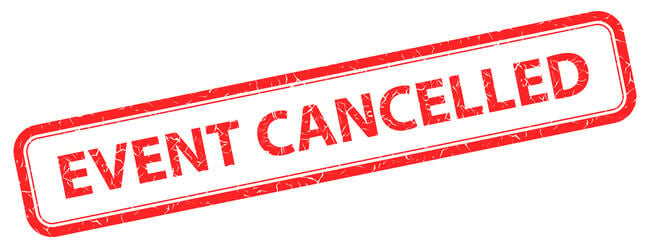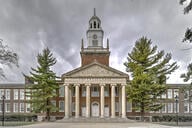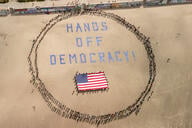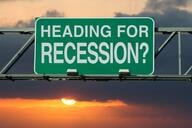You have /5 articles left.
Sign up for a free account or log in.

FingerMedium/DigitalVision Vectors/Getty Images
Being arrested by armed riot police on my own campus was not, somehow, the most jarring thing that has happened to me since the spring of 2024. More disturbing was the experience of being canceled by my hometown.
In June 2024, I was supposed to give the second of two lectures in a series entitled “History of the Middle East and the Israeli-Palestinian Conflict” at the public library in San Anselmo, Calif., a leafy suburb of San Francisco best known as the longtime home of George Lucas.
I grew up in San Anselmo during the Sept. 11 era and vividly remember how stereotypes and misperceptions of the Middle East were used to justify war in Iraq and discrimination against Arabs and Muslims at home. I was shaped by the commonplace refrains of that moment, especially that Americans needed to learn more about the Middle East. So, I did. I learned Arabic and Farsi and spent years abroad living across the region. I earned a Ph.D. in Middle Eastern history and am now a professor at a public university in Colorado. I see teaching as a means of countering the misrepresentations that generate conflict.
But as the second lecture approached, I began receiving alarmed messages from the San Anselmo town librarian. She told me of a campaign to cancel the lecture so intense that discussions about how to respond involved the town’s elected officials, including the mayor. I was warned that “every word you utter tomorrow night will be scrutinized, dissected and used against you and the library” and that she had become “concerned for everyone’s well-being.” Just hours before it was scheduled to begin, the lecture was canceled.
I later learned more about what had transpired. At a subsequent town council meeting, the librarian described a campaign of harassment and intimidation that included “increasingly aggressive emails” and “coordinated in-person visits” so threatening that she felt that they undermined the safe working environment of library staff.
In Middle Eastern studies, such stories have become routine. A handful have received public attention—the instructor suspended for booking a room on behalf of a pro-Palestinian student organization, or the Jewish scholar of social movements investigated by Harvard University for supposed antisemitism. Professors have lost job offers or been fired. Even tenure is no protection. These well-publicized examples are accompanied by innumerable others which will likely never be known. In recent months, I have heard harrowing stories from colleagues: strangers showing up to classes and sitting menacingly in the back of the room; pressure groups contacting university administrators to demand that they be fired; visits from the FBI; a deluge of racist hate mail and death threats. It is no surprise that a recent survey of faculty in the field of Middle East Studies found that 98 percent of assistant professors self-censor when discussing Israel-Palestine.
Compared to the professors losing their jobs and the student demonstrators facing expulsion—and even deportation—my experience is insignificant. It is nothing compared to the scholasticide in Gaza, where Israeli forces have systematically demolished the educational infrastructure and killed untold numbers of academics and students. But the contrast between my anodyne actions and the backlash they have generated illustrates the remarkable breadth of the censorship that permeates American society. The mainstream discourse has been purged not just of Palestinian voices, but of scholarly ones. Most significantly, censorship at home justifies violence abroad. Americans are once again living in an alternate reality—with terribly real consequences.
On Oct. 7, 2023, it was clear that a deadly reprisal was coming. It was equally evident that no amount of force could free Israeli captives, let alone “defeat Hamas.” I contacted my university media office in hopes of providing valuable context. I had never given a TV interview before, so I spent hours preparing for a thoughtful discussion. Instead, I was asked if this was “Israel’s Pearl Harbor.”
Well, no, I explained. It was the tragic and predictable result of a so-called peace process that has, for 30 years and with U.S. complicity, done little more than provide cover for the expansion of Israeli settlements. Violence erupts when negotiation fails. Only by understanding why people turn to violence can we end it. I watched the story after it aired. Nearly the whole interview was cut.
I accepted or passed to colleagues all the interview requests that I received. But they soon dried up. Instead, I began receiving hate mail.
It quickly became clear that I had to take the initiative to engage with the public. I held a series of historical teach-ins on campus. The audience was attentive, but small. I reached out to a local school district where I had previously provided curriculum advice. I never heard back. I contacted my high school alma mater and offered to speak there. They were too afraid of backlash. I was eventually invited to speak at two libraries, including San Anselmo’s. Everyone else turned me down.
In April 2024, the Denver chapter of Students for a Democratic Society organized yet another protest in their campaign to pressure the University of Colorado to divest from companies complicit in the Israeli occupation. This event would be different. As one of the students spoke, others erected tents, launching what would become one of the longest-lasting encampments in the country.
There was no cause for panic. The encampment did not interfere with classes or even block the walkway around the quad. Instead, it became the kind of community space that is all too hard to build on a commuter campus. It hosted speakers, prayer meetings and craft circles. But as I left a faculty meeting the day after the start of the encampment, I sensed that something was wrong. I arrived on the quad to find a phalanx of armed riot police facing down a short row of students standing hand in hand on the lawn.
Fearing what would happen next, two colleagues and I joined the students and sat down, hoping to de-escalate the situation and avoid violence. The police surrounded us, preventing any escape. Then they were themselves surrounded by faculty, students and community members who were clearly outraged by their presence. We sat under the sun for nearly two hours as chaos swirled around us. The protesters cleared away the tents to demonstrate their compliance. It made no difference. Forty of us were arrested, zip-tied and jailed. I was charged with interference and trespassing. Others faced more serious charges. I was detained for more than 12 hours, until 3:00 in the morning.
The arrests backfired. When the police departed, the protesters returned, invigorated by an outpouring of community support. I visited the encampment regularly over the following weeks. When the threat of war with Iran loomed, I gave a talk about Iranian history. When the activists organized their own graduation, they invited me to give a commencement address. I spoke about their accomplishments: that they had taken real risks, made real sacrifices and faced real consequences in order to do what was right. The encampment became the place where I could speak most freely, on campus or off.
While the encampment came to an end in May, the prosecutions did not. The city offered me deferred prosecution, meaning that the matter would be dropped if I did not break the law for six months. I am not, to put it lightly, a seasoned lawbreaker, so the deal would have effectively made everything disappear. I turned it down. Accepting the offer would have prevented me from challenging the legality of the arrests, and I was determined to do what I could to prevent armed riot police from ever again suppressing a peaceful student demonstration. It was a matter of principle and precedent. A civil rights attorney agreed to represent me pro bono. I would fight the charges.
During my pretrial hearings, I learned more about the cancellation of my lecture in San Anselmo. A local ceasefire group served the town with a freedom of information request that yielded hundreds of pages of emails. Two days before the talk was scheduled, one local resident sent an “all hands on deck” email that called for a coordinated campaign against my lecture “in hopes of getting it canceled.” A less technologically savvy recipient forwarded the message on to the library, providing an inside view.
The denunciations presented a version of myself that I did not recognize. The letters relied on innuendo and misrepresentation. Many claimed that I was “pro-Hamas” or accused me of antisemitism, which they invariably conflated with criticism of Israeli policy. Several expressed concern about what I might say, rather than anything I have ever actually said, while others misquoted me. Fodder for the campaign came largely from media reports of my arrest and video of my commencement address, both taken out of context. One claimed that the talk was “a violation of multiple Federal and California Statutes.” Another claimed that I “seemed to promote ongoing violence”—the lawyerly use of the word “seemed” betraying the lack of evidence behind the accusation.
Perhaps the most popular claim was that I am biased, an activist rather than a scholar. My opponents seemed especially offended by my use of the word “genocide.” But genocide is not an epithet—it is an analytical term that represents the consensus in my field. A survey of Middle East studies scholars conducted in the weeks surrounding the talk found that 75 percent viewed Israeli actions in Gaza as either “genocide” or “major war crimes akin to genocide.”
I was most struck by how many people objected to the idea of contextualizing the Oct. 7 attack; one even called it “insulting.” But contextualization is not justification. Placing events in a wider frame is central to the study of history—indeed, it is why history matters. If violence is not explained by the twists and turns of events, it can only be understood as the product of intrinsic qualities—that certain people, or groups of people, are inherently violent or uncivilized. In the absence of context, bigotry reigns.
I did what I could to fight back against the censorship campaign. After reading the library emails, I reached out to journalists at several local news outlets to inform them about the incident. None followed up. The only report ever published was written by an independent journalist on Substack.
In the weeks leading up to my trial, I wrote an op-ed calling for the charges to be dropped. I noted that the protest was entirely peaceful until the police arrived. I asked how our students, especially our undocumented students or students of color, can feel safe on campus when the authorities respond to peaceful demonstrations by calling the police. I sent the article to a local paper. I never heard back. I sent it to a second. Then a third. None responded. It was never published.
In October, prosecutors dropped the charges against me. The official order of dismissal stated that they did not believe that they had a reasonable likelihood of conviction. I have now joined a civil lawsuit against the campus police in the hope that it will make the authorities think twice before turning to the police to arrest student demonstrators.
Scholars of the Middle East are caught in an inescapable bind. Activist spaces are the only ones left open to us, but we are dismissed as biased when we use them. We are invited to share our insights only if they are deemed uncontroversial by the self-appointed gatekeepers of the conventional wisdom. If we condemn—or even just name—the genocide unfolding before our eyes, we are deplatformed and silenced. The logic is circular and impenetrable. It is also poison to the body politic. It rests on a nonsensical conception of objectivity that privileges power over truth. This catch-22 is no novel creation of the new administration. The institutions most complicit in its creation are the pillars of society ostensibly dedicated to the pursuit of justice—the press, the courts and the academy itself. They have constricted the boundaries of respectable discourse until they fit comfortably within the Beltway consensus. Rather than confronting reality, they have become apologists for genocide and architects of the post-truth world. They have learned nothing from Iraq. Nor do they want to. They don’t want to learn about the Middle East.




